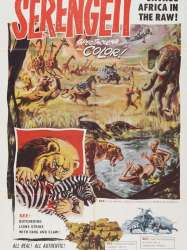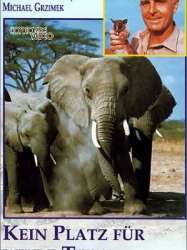Bernhard Grzimek is a Actor, Director, Scriptwriter and Producer Allemand born on 24 april 1909 at Nysa (Pologne)

Bernhard Klemens Maria Grzimek ([ˈɡʒɪmɛk]; April 24, 1909 - March 13, 1987) was a renowned Silesian-German zoo director, zoologist, book author, editor, and animal conservationist in postwar West-Germany.
Grzimek was born in Neisse (Nysa), Prussian Silesia. His father Paul Franz Constantin Grzimek was a lawyer and civil law notary and his mother was Margarete Margot (nee Wanke).
After studying veterinary medicine in 1928, first at Leipzig and later in Berlin, Grzimek received a doctorate in 1933.
He married Hildegard Prüfer May 17, 1930 and had three sons: Rochus, Michael, and an adopted son, Thomas.
World War II and aftermath
During World War II he was a veterinarian in the Wehrmacht and worked for the Reichsernährungsministerium (Food Ministry of the 3rd Empire) in Berlin. In early 1945, the Gestapo raided Grzimek's Berlin apartment, because he repeatedly had supplied food to hidden Jews. Grzimek then fled from Berlin to Frankfurt, which was occupied by the U.S. Army. In April 1945 he was appointed police chief of Frankfurt by U.S. authorities, but he refused the job.
In late 1947, Grzimek was accused of membership of the NSDAP by the U.S. military government, which he denied. He was then removed from office in the Frankfurt Zoo (see below), fined, and sent for denazification where, on 23 March 1948, it turned out he was innocent (Category 5; Exonerated) and had participated in the Resistance War. He was then reinstated at the Zoo by the U.S. government but his reputation was besmirched. The Zoo Director of Munich, Heinz Heck, led a private smear and lawsuit campaign against him. Grzimek was acquitted of any wrongdoing in 1949.
Zoo director
Grzimek became director of the Frankfurt Zoological Garden on 1 May 1945. The zoo then in ruins and all animals killed, except 20, he prevented the permanent closure of the Frankfurt Zoo and the relocation of the "Center Zoo" to the suburbs, which he made into one of the largest zoological gardens in Germany. The Zoo reopened on 1 July 1945, after all bomb craters were filled and buildings temporarily restored. With festivals, dances and actors, Grzimek lured the Frankfurt population into the zoo and received the assent of the Provisional Government and the U.S. military to continue the Frankfurt Zoo.
Grzimek led the Frankfurt Zoo for 29 years, until his retirement on 30 April 1974.
At the same time he served as president of the Frankfurt Zoological Society for over forty years. The society - organized on similar principles as its London and New York counterparts - runs a number of wildlife conservation projects both in Germany and overseas; most well-known is its ongoing work in the Serengeti ecosystem in Tanzania, East Africa.
Conservationism and other activities
In 1954 he founded the image agency Okapia, specialized in animals and nature. Today, the agency specializes in science and gives 650 photographers a job. The firm is led by Christian Bernhard Grzimek, the son of his son who died in the Serengeti.
In 1975 he co-founded the League for the Environment and Nature Conservation (BUND) and bought ten acres of forest areas and wetlands in the Steiger forest near Michelau im Steigerwald which he left to itself.
Grzimek is most famous for the work he undertook for the conservation of the Serengeti. He spent several years studying the wildlife there along with his son Michael, especially on areal observation and counts of large scale annual migrations. In 1959 Michael was killed in an air crash while flying the Dornier Do 27 due to a collision with a Griffon Vulture. He wrote a best-selling book called Serengeti shall not die, which appealed enormously to the public and was key in driving the creation of the Serengeti National Park.
He prophesied in his book:
Large cities continue to proliferate. In the coming decades and centuries, men will not travel to view marvels of engineering, but they will leave the dusty towns in order to behold the last places on earth where God’s creatures are peacefully living. Countries which have preserved such places will be envied by other nations and visited by streams of tourists. There is a difference between wild animals living a natural life and famous buildings. Palaces can be rebuilt if they are destroyed in wartime, but once the wild animals of the Serengeti are exterminated no power on earth can bring them back.
The documentary based on the film won the Academy Award for Documentary Feature in 1959.
End of life
Grzimek died in Frankfurt am Main in 1987, falling asleep while watching a circus performance with a group of children. His ashes were later transferred to Tanzania and buried next to his son Michael at the Ngorongoro Crater.
Source : Wikidata
Bernhard Grzimek

Birth name Bernhard Klemens Maria Hoffbauer Pius Grzimek
Nationality German
Birth 24 april 1909 at Nysa (Pologne)
Death 13 march 1987 (at 77 years) at Frankfurt (German)
Awards Grand Merit Cross of the Order of Merit of the Federal Republic of Germany
Nationality German
Birth 24 april 1909 at Nysa (Pologne)
Death 13 march 1987 (at 77 years) at Frankfurt (German)
Awards Grand Merit Cross of the Order of Merit of the Federal Republic of Germany
Biography
Early years and educationGrzimek was born in Neisse (Nysa), Prussian Silesia. His father Paul Franz Constantin Grzimek was a lawyer and civil law notary and his mother was Margarete Margot (nee Wanke).
After studying veterinary medicine in 1928, first at Leipzig and later in Berlin, Grzimek received a doctorate in 1933.
He married Hildegard Prüfer May 17, 1930 and had three sons: Rochus, Michael, and an adopted son, Thomas.
World War II and aftermath
During World War II he was a veterinarian in the Wehrmacht and worked for the Reichsernährungsministerium (Food Ministry of the 3rd Empire) in Berlin. In early 1945, the Gestapo raided Grzimek's Berlin apartment, because he repeatedly had supplied food to hidden Jews. Grzimek then fled from Berlin to Frankfurt, which was occupied by the U.S. Army. In April 1945 he was appointed police chief of Frankfurt by U.S. authorities, but he refused the job.
In late 1947, Grzimek was accused of membership of the NSDAP by the U.S. military government, which he denied. He was then removed from office in the Frankfurt Zoo (see below), fined, and sent for denazification where, on 23 March 1948, it turned out he was innocent (Category 5; Exonerated) and had participated in the Resistance War. He was then reinstated at the Zoo by the U.S. government but his reputation was besmirched. The Zoo Director of Munich, Heinz Heck, led a private smear and lawsuit campaign against him. Grzimek was acquitted of any wrongdoing in 1949.
Zoo director
Grzimek became director of the Frankfurt Zoological Garden on 1 May 1945. The zoo then in ruins and all animals killed, except 20, he prevented the permanent closure of the Frankfurt Zoo and the relocation of the "Center Zoo" to the suburbs, which he made into one of the largest zoological gardens in Germany. The Zoo reopened on 1 July 1945, after all bomb craters were filled and buildings temporarily restored. With festivals, dances and actors, Grzimek lured the Frankfurt population into the zoo and received the assent of the Provisional Government and the U.S. military to continue the Frankfurt Zoo.
Grzimek led the Frankfurt Zoo for 29 years, until his retirement on 30 April 1974.
At the same time he served as president of the Frankfurt Zoological Society for over forty years. The society - organized on similar principles as its London and New York counterparts - runs a number of wildlife conservation projects both in Germany and overseas; most well-known is its ongoing work in the Serengeti ecosystem in Tanzania, East Africa.
Conservationism and other activities
In 1954 he founded the image agency Okapia, specialized in animals and nature. Today, the agency specializes in science and gives 650 photographers a job. The firm is led by Christian Bernhard Grzimek, the son of his son who died in the Serengeti.
In 1975 he co-founded the League for the Environment and Nature Conservation (BUND) and bought ten acres of forest areas and wetlands in the Steiger forest near Michelau im Steigerwald which he left to itself.
Grzimek is most famous for the work he undertook for the conservation of the Serengeti. He spent several years studying the wildlife there along with his son Michael, especially on areal observation and counts of large scale annual migrations. In 1959 Michael was killed in an air crash while flying the Dornier Do 27 due to a collision with a Griffon Vulture. He wrote a best-selling book called Serengeti shall not die, which appealed enormously to the public and was key in driving the creation of the Serengeti National Park.
He prophesied in his book:
Large cities continue to proliferate. In the coming decades and centuries, men will not travel to view marvels of engineering, but they will leave the dusty towns in order to behold the last places on earth where God’s creatures are peacefully living. Countries which have preserved such places will be envied by other nations and visited by streams of tourists. There is a difference between wild animals living a natural life and famous buildings. Palaces can be rebuilt if they are destroyed in wartime, but once the wild animals of the Serengeti are exterminated no power on earth can bring them back.
The documentary based on the film won the Academy Award for Documentary Feature in 1959.
End of life
Grzimek died in Frankfurt am Main in 1987, falling asleep while watching a circus performance with a group of children. His ashes were later transferred to Tanzania and buried next to his son Michael at the Ngorongoro Crater.
Usually with
Filmography of Bernhard Grzimek (2 films)
Actor

Serengeti Shall Not Die (1959)
, 1h25Directed by Bernhard Grzimek
Genres Documentary
Themes Films set in Africa, Films about animals, Environmental films, Documentaire animalier, Documentary films about environmental issues, Documentary films about nature
Actors Bernhard Grzimek
Roles Self (voice)
Rating77%





Le documentaire est un plaidoyer pour l'importance de la préservation de l'écosystème du Parc national du Serengeti en Tanzanie, rendu célèbre dans le monde entier grâce à Bernhard Grzimek.
Director

Serengeti Shall Not Die (1959)
, 1h25Directed by Bernhard Grzimek
Genres Documentary
Themes Films set in Africa, Films about animals, Environmental films, Documentaire animalier, Documentary films about environmental issues, Documentary films about nature
Actors Bernhard Grzimek
Rating77%





Le documentaire est un plaidoyer pour l'importance de la préservation de l'écosystème du Parc national du Serengeti en Tanzanie, rendu célèbre dans le monde entier grâce à Bernhard Grzimek.

Bambuti (1956)
, 1h19Directed by Bernhard Grzimek
Genres Documentary
Themes Films set in Africa, Documentary films about nature
Actors Viktor de Kowa, Carleton Young
Rating69%





Scriptwriter

Serengeti Shall Not Die (1959)
, 1h25Directed by Bernhard Grzimek
Genres Documentary
Themes Films set in Africa, Films about animals, Environmental films, Documentaire animalier, Documentary films about environmental issues, Documentary films about nature
Actors Bernhard Grzimek
Rating77%





Le documentaire est un plaidoyer pour l'importance de la préservation de l'écosystème du Parc national du Serengeti en Tanzanie, rendu célèbre dans le monde entier grâce à Bernhard Grzimek.

Bambuti (1956)
, 1h19Directed by Bernhard Grzimek
Genres Documentary
Themes Films set in Africa, Documentary films about nature
Actors Viktor de Kowa, Carleton Young
Rating69%





Producer

Serengeti Shall Not Die (1959)
, 1h25Directed by Bernhard Grzimek
Genres Documentary
Themes Films set in Africa, Films about animals, Environmental films, Documentaire animalier, Documentary films about environmental issues, Documentary films about nature
Actors Bernhard Grzimek
Roles Producer
Rating77%





Le documentaire est un plaidoyer pour l'importance de la préservation de l'écosystème du Parc national du Serengeti en Tanzanie, rendu célèbre dans le monde entier grâce à Bernhard Grzimek.
 Connection
Connection


